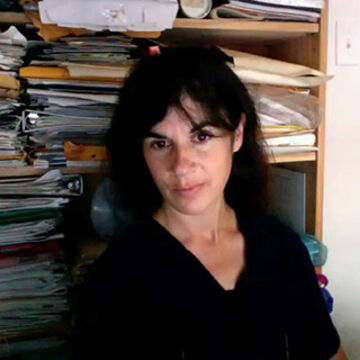

Tirtza Even
Professor
Contact
Bio
Professor, Film, Video, New Media, and Animation (2010). BA, 1989, Hebrew University, Jerusalem; MA, 1993, MPS, 1995, NYU. Awards: Artadia Awards (Chicago), Jerome Foundation's Media Arts Award, 3ARTs Visual Arts and Next Level Awards, Efroymson Contemporary Arts Fellowship, Illinois Arts Council Artist Fellowship, and multiple NYSCA and DCASE Individual Artist Grants. Collections: Museum of Modern Art (NY), Jewish Museum (NY), and Harvard University's Carpenter Center, among others. Publications: Switching Codes; The Jewish Identity Project: New American Photography. Exhibitions: Museum of Modern Art (NY), Whitney Biennial, Johannesburg Biennial, Museum of Modern Art’s Doc Fortnight (NY), RIDM Festival (Montreal), Rotterdam Film Festival, and more.
An experimental documentary maker for over 25 years, Tirtza Even (she/her) has produced work which ranges from feature-length documentaries to multichannel, immersive and interactive video installations. Her projects, which rely on almost imperceptible digital manipulation of slow and extended moments, depict the less overt manifestations of complex, and at times extreme, social and political dynamics in locations such as Palestine, Turkey, the United States, and Germany.
Even has been a featured speaker at programs such as MIT Doc Lab, the Whitney Museum Seminar series, SXSW Interactive Conference, the Digital Flaherty Seminar, ACM Multimedia, and many more. Her work is distributed by Heure Exquise (France), Video Data Bank (US), and Groupe Intervention Video (Canada).